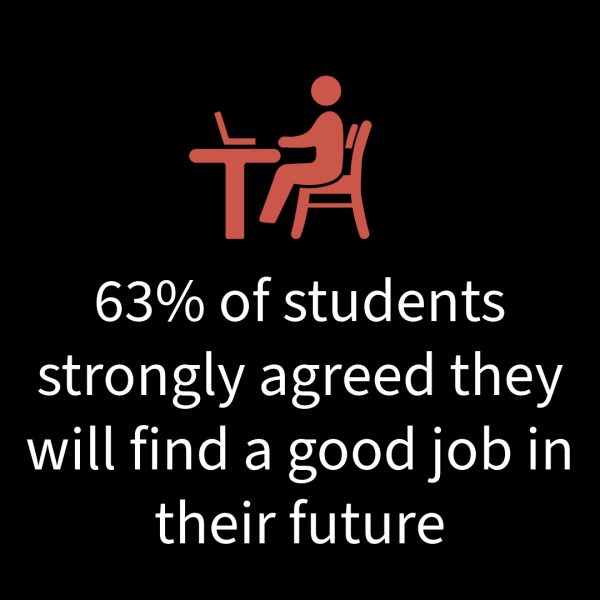
 Younger generations have been questioning the value of college. Young college graduates are more likely to be unemployed and spend a longer time searching for a job than previous generations. As a result, fewer people are pursuing a degree.
Younger generations have been questioning the value of college. Young college graduates are more likely to be unemployed and spend a longer time searching for a job than previous generations. As a result, fewer people are pursuing a degree.
With the rising cost of college education many high school students and graduates are wondering if the benefit of a degree is worth the amount of debt. Alternatives to college are becoming increasingly popular because of the shorter training period and greater earning opportunities. However, what path high school graduates choose also depends on their personality and learning style. For example, a student who was unmotivated and got bad grades in high school will likely not last long in a competitive college environment.
“Our goal is to help them make the choices that will turn out best for them given their individual strengths,” Brookings.edu said. “It may be that for a student with poor grades who is on the fence about enrolling in a four-year program, the most bang-for-the-buck will come from a vocationally-oriented associate’s degree or career-specific technical training.”
Learning a trade is one of the many options available for those seeking alternatives to college. Apprenticeship programs last only two years, as opposed to the typical 4-year bachelor’s degree programs, which can be appealing to students because they can start working much sooner. Metro Community College is one place that offers several different types of apprenticeship programs.
“The apprenticeship program combines hands-on experience in the industry and the classroom along with getting a degree at MCC,” Metro Community College representative Alyssa Wiese said.
Another potential benefit to learning a trade is the amount of opportunities. There is an increasing growth rate for jobs among the trades creating a higher need for people going into the industry. The most popular trades currently are electrical, plumbing, auto-mechanics, and construction.
“A big reason why we see trade programs increasing right now is because a lot of people who are working in the trades are much older, so they are retiring. So the pay is pretty good,” Wiese said.
Opportunity is everywhere, however, those looking for a different experience than that which is typically recommended would consider enlisting in the military. The military has a lot of potential regarding the benefits it can provide. For example, it provides job security, medical benefits, and retirement, and creates a sense of purpose and community for many; all of which are factors people consider when deciding on a career path.
“I hope to gain a feeling or sense of family that I know I would have stronger than that of one I would get in college,” senior Lily Predoehl said.
Some individuals like the idea of being in control of their finances and not relying on a company or organization for their money. Entrepreneurship is an option for people who are reluctant to go to college because of the amount of time, commitment, and debt that results from it, and it is not guaranteed that a degree would land someone a job.
“When starting a business, on the other hand, you’ll have money coming in rather than going out,” Yale said.
Stability and security are factors many people value in a career, especially those who do not come from money. Joining the workforce is an option for those who want to build experience and earn money immediately after graduating. Individuals providing for a family may find this path more reliable and sustainable than if they chose college because they do not want to risk accumulating that amount of debt.
“Starting work directly after high school can provide valuable job experience that can be used later in your career.” Truth In American Education said. “You can learn new skills, develop a strong work ethic, and gain an understanding of the working world.”
Other high school graduates may not know what they are passionate about, what type of education would benefit them the most, or even if they want to pursue further education. Students may consider a gap year to discover their interests and be involved in the real world before making a major life-defining decision such as what they will do for the rest of their lives.
“Other students understand that after they graduate college and start a job, they may never have another chance to take a whole year to expand their horizons.” Fontbonne University said.
Generally, most bachelor’s degrees provide people with a greater lifetime earning potential compared with most other options, however, it ultimately depends on what path is chosen. For example, those who hold a bachelor’s degree make 24,000 dollars more a year than those with just a high school diploma. However, money is not the only factor considered when deciding on a career because many people are also concerned with how they will find fulfillment.
“In favor of simplicity, we used the blanket term “college” to argue that a traditional four-year bachelor’s degree is not for everyone.” Brookings.edu said. “We do think that some sort of postsecondary training is a good idea for almost everyone. This includes associate’s degrees, technical and vocational certification, apprenticeships, and worker training programs.”
Every individual has unique strengths and weaknesses that would either help or hinder them in pursuing a college education, making it impossible for a degree to be right for everyone. Some people perform better with hands-on training, some prefer to be self-reliant, and others may decide to wait to make a decision. Individuals are on separate journeys and have different needs, goals, and values that may not apply to the general population.
“Ultimately, higher education decisions are made by individual students and their families, and are based on their unique interests, strengths, and personal values, not only income and career prospects.” Brookings.edu said.


